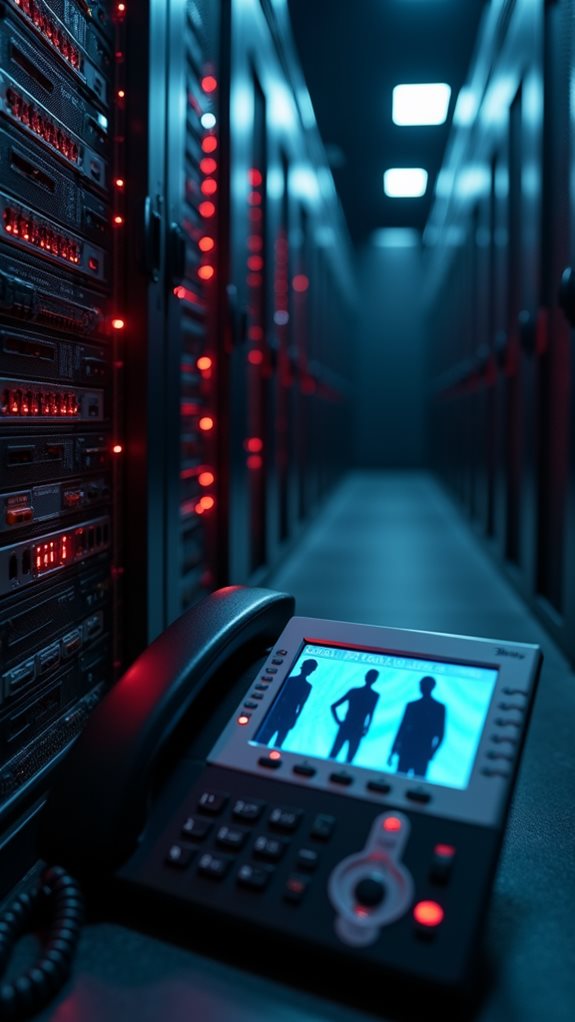While VoIP can slash your communication costs by 75%, your provider might not be telling you about serious security risks. Over 25% of global networks lack proper encryption, making your calls vulnerable to eavesdropping and cybercrime. You're also facing threats from SPIT attacks, default password vulnerabilities, and potential data breaches that could cost your business millions. Understanding these hidden challenges and implementing robust protection measures will determine your VoIP system's true success.
The Hidden Security Vulnerabilities of VoIP Systems
While VoIP technology has revolutionized business communications with its cost-effective solutions, you'll find that it comes with a set of hidden security vulnerabilities that many providers don't openly discuss.
Your conversations could be at risk through eavesdropping risks when calls aren't properly encrypted, and malware threats can compromise your entire system without proper protection. The rising cost of cybercrime, expected to reach $10.5 trillion by 2025, highlights the critical importance of securing your VoIP systems. Unencrypted VoIP calls can expose sensitive information to cyber threats, increasing the likelihood of data breaches.
You're not alone in facing these challenges, as many businesses discover these risks only after implementing VoIP systems. Malicious users can launch SPIT attacks that flood your system with automated spam calls.
What's particularly concerning is that standard security measures often aren't enough – unencrypted connections leave your calls exposed, and default device passwords create easy access points for cybercriminals.
To protect your business communications, you'll need to implement strong authentication, encryption protocols, and regular security updates, ensuring your VoIP system remains secure against evolving threats.
Data Efficiency Secrets That Save You Money
Since most VoIP providers don't openly discuss their data efficiency strategies, you're likely missing out on significant cost-saving opportunities that lie within your system's bandwidth management.
You can slash your costs by up to 30% through smart data compression and codec optimization techniques that your provider hasn't revealed.
Here's what you need to know: your VoIP system only requires 80-100 kbps per call, but you're probably using more than necessary. Bandwidth and internet quality play a critical role in ensuring you achieve the best call clarity while minimizing costs.
Businesses utilizing VoIP technology see an average cost reduction of 75% compared to traditional phone systems.
By implementing advanced compression techniques and selecting the right codecs, you'll join the 82% of companies reporting significant savings after optimizing their systems.
The secret lies in managing your bandwidth effectively – something as simple as adjusting your Quality of Service settings can dramatically improve call quality while reducing data usage.
You're not just saving money; you're maximizing your system's potential.
Using features like silence suppression during calls can significantly reduce your bandwidth consumption without compromising quality.
Market Growth Statistics Your Provider Keeps Quiet

The explosive growth of the VoIP market reveals a striking reality your provider isn't advertising.
While they're focusing on selling you basic packages, market predictions show the industry skyrocketing to $270.05 billion by 2029, with a remarkable 16.3% annual growth rate.
You're part of a massive shift in how businesses communicate. The adoption of 5G technology is revolutionizing VoIP capabilities with superior speed and reduced latency. The implementation of unified communications platforms is driving unprecedented business efficiency through seamless integration of voice, video, and messaging. In fact, the VoIP services market is expected to generate $100 billion in the Asia Pacific region alone by 2024.
What's even more telling is the user demographics they're not discussing.
You're joining a community of over 3 billion VoIP users worldwide by 2025, with 70% of small businesses already embracing this technology.
The Asia Pacific region leads with a $60 billion market share, followed by Europe at $46.5 billion.
When your provider downplays these numbers, they're hiding how essential VoIP has become to global business operations, and more importantly, how much bargaining power you actually have as a consumer.
Cybersecurity Threats Lurking in Your VoIP Network
Four major cybersecurity threats are targeting your VoIP system right now, yet most providers won't openly discuss these risks. Your business could be exposed to eavesdropping risks, where attackers silently monitor your confidential calls, and sophisticated Caller ID manipulation schemes that deceive your team into sharing sensitive information.
End-to-end encryption helps safeguard your voice communications from malicious interception and monitoring. Additionally, implementing strong user authentication methods is crucial in defending against unauthorized access and ensuring that only legitimate users connect to your VoIP network.
Like many of your peers in the industry, you're probably unaware that cybercriminals are using advanced packet sniffers and AI-assisted tools to breach VoIP networks, especially those with weak passwords or outdated software.
While providers focus on selling you features, they often downplay these vulnerabilities that could lead to substantial financial losses and data breaches. With the average cost of a security breach in the U.S. reaching $9.4 million, organizations cannot afford to ignore these risks.
Don't wait until it's too late – understanding these threats is your first step toward protecting your communication infrastructure from increasingly sophisticated attacks.
Essential Protection Measures for Your VoIP System

Protecting your VoIP system requires a multi-layered security approach that you'll need to implement immediately. Conducting regular security training helps employees recognize and avoid potential threats to your system. Security experts advise implementing 24/7 technical support to quickly address any potential breaches. Additionally, it is crucial to employ strong authentication methods to safeguard sensitive information in your VoIP communications.
You're facing VoIP vulnerabilities that could compromise your entire communication network, but don't worry – you're not alone in this challenge.
Through proper user education and implementing robust security measures, you'll join countless other businesses that have successfully secured their VoIP systems.
- Deploy strong authentication methods, including complex passwords and multi-factor authentication
- Enable encryption across all VoIP traffic using SRTP and TLS protocols
- Establish a thorough monitoring system with intrusion detection capabilities
The Real Cost Benefits Behind VoIP Technology
Your VoIP provider's sales pitch likely glosses over the staggering 75% reduction in communication costs you'll experience when shifting from traditional phone systems.
You'll notice immediate savings in your network infrastructure costs, as VoIP eliminates the need for separate voice and data networks, streamlining your entire communication framework.
Beyond the upfront benefits, you're looking at an average annual savings of $1,200 per employee through reduced phone bills and maintenance expenses, making VoIP a compelling investment for your business's bottom line. Moreover, these savings are amplified by utilizing existing internet connections, allowing for unlimited calling from anywhere.
Silent Data Equals Savings
Money talks, but silence saves in the world of VoIP technology. Did you know that up to half of your voice conversations are actually silent?
While traditional phone systems waste resources by transmitting this dead air, VoIP's silent savings technology works smarter by detecting and transmitting only when someone's speaking. This voice efficiency translates into real dollars – we're talking about significant monthly savings for your business.
Here's what you're getting with VoIP's silence suppression:
- Reduction in data transmission by up to 50% during calls
- Monthly savings averaging $1,200 for businesses
- Enhanced call quality without wasting bandwidth
You're joining a growing community of over 1 billion users who've discovered these hidden benefits. Additionally, VoIP facilitates enhanced communication and collaboration, which can further improve operational efficiency and team productivity.
As cloud telephony costs continue to drop by 3-5% annually, you'll find yourself on the winning side of this technological revolution.
Network Costs Drop Significantly
While traditional phone systems continue to burden businesses with hefty infrastructure costs, VoIP technology has revolutionized the telecommunications landscape by slashing network expenses across the board.
You'll discover that VoIP advantages extend far beyond basic connectivity – implementing these systems can reduce your operational costs by up to 30% while cutting international call expenses by an impressive 90%.
The cost efficiency of VoIP becomes even more apparent when you consider the monthly savings. Your business can expect to save between 50% and 75% on overall communication costs, with an average annual saving of $1,200 per employee. Additionally, VoIP can optimize resource allocation, allowing businesses to redirect funds to core areas for growth.
Total Communication Bill Reduction
Businesses implementing VoIP technology consistently report staggering cost reductions across their entire communication infrastructure.
You'll join the 70% of companies already saving between 30-50% on their total communication expenses through smart cost forecasting and optimization strategies.
Here's what your current provider mightn't be highlighting about VoIP's financial impact:
- Your business can save up to $1,200 per employee annually through reduced infrastructure costs and cheaper international calls.
- Communication optimization through VoIP can slash conferencing expenses by 30%.
- Usage-based pricing models deliver 10-25% savings on telecom costs.
- With predictable monthly expenses that align with financial goals, your business can better plan and allocate resources.
Your shift to VoIP isn't just about cutting costs—it's about joining a growing community of forward-thinking businesses.
With the global VoIP market projected to reach $93 billion by 2027, you're positioning your company for sustainable, long-term savings.
Historical Development and Industry Evolution

Since its humble beginnings in the 1920s with Bell Laboratories, VoIP technology has undergone a remarkable transformation that's revolutionized how we communicate.
You might be surprised to learn that what started as an experimental voice transmission over ARPANET in 1973 has evolved into a $145.76 billion industry today.
The VoIP milestones you're benefiting from weren't achieved overnight.
When Vocaltec launched the first VoIP software in 1995, followed by Skype's game-changing debut in 2003, these technological advancements paved the way for your current crystal-clear calls.
By 2018, the industry generated $20 billion in revenue in the US alone, and now it accounts for 60% of all new connections.
You're part of a communication revolution that's continuously evolving to serve your needs better, with the projected VoIP market value anticipated to reach $55 billion by 2025.
Network Attacks and Their Impact on Voice Quality
Your VoIP system's crystal-clear calls can quickly turn into a garbled mess when Distributed Denial of Service (DDoS) attacks flood your network with malicious traffic.
You'll notice dropped calls, echoing voices, and choppy audio quality as these attacks overwhelm your bandwidth and compromise your system's performance.
To protect against these disruptions, you'll need to implement packet loss prevention strategies like traffic prioritization, robust firewalls, and dedicated VLANs for your voice communications.
DDoS Effects on Calls
When a DDoS attack strikes your VoIP system, you'll quickly notice the devastating impact on call quality and service reliability.
Your business communications can grind to a halt as bandwidth becomes overwhelmed, leaving you and your team struggling to maintain essential connections.
Without proper DDoS mitigation measures, you're facing more than just dropped calls – you're risking your company's VoIP resilience and reputation.
Here's what you'll experience during a DDoS attack:
- Significant delays in call initiation, making it impossible to conduct time-sensitive business
- Distorted audio quality that renders conversations unintelligible
- Complete system outages that can last hours or even days
Don't let your business become another DDoS statistic.
You need a VoIP provider that's transparent about their security measures and offers robust protection against these increasingly common threats.
Packet Loss Prevention Strategies
While network congestion and hardware failures pose significant threats to VoIP quality, packet loss remains the silent killer of clear communications.
You're probably experiencing its effects – those frustrating choppy calls and mysterious echoes – without even realizing it.
You'll be relieved to know that effective network optimization can dramatically reduce packet loss.
Start by implementing Quality of Service settings to prioritize your voice traffic, and don't hesitate to upgrade your bandwidth if you're consistently experiencing issues.
Regular network monitoring using tools like SolarWinds or Auvik will help you spot potential problems before they impact your calls.
Privacy Concerns Every VoIP User Should Know

Just how secure are your VoIP conversations? The truth about VoIP privacy might surprise you – and not in a good way. Your voice calls, traveling through the internet, are more vulnerable to data interception than you might think, with over 25% of networks worldwide lacking proper encryption.
Here's what you need to know about protecting your conversations:
- Your calls can be reconstructed from intercepted data packets, potentially exposing sensitive information.
- Cybercriminals actively target VoIP systems, contributing to the staggering $10.5 trillion global cybercrime costs expected by 2025.
- Without proper security measures, you're vulnerable to spoofing and phishing attacks.
Don't let these risks compromise your communication security.
While VoIP offers incredible benefits, it's essential to choose a provider that prioritizes encryption and maintains robust security protocols.
Your privacy depends on making informed decisions about your VoIP service.
Frequently Asked Questions
Can I Keep My Existing Phone Number When Switching to Voip?
Yes, you can keep your number thanks to number portability laws. Just check provider limitations in your area first. You'll join many others who've successfully switched while keeping their familiar phone numbers.
What Happens to My Voip Service During a Power Outage?
Your VoIP service will stop working during power outages unless you've got power backup solutions in place. You'll want to contemplate battery options like UPS systems or mobile apps to stay connected with others.
Does Voip Work With Fax Machines and Credit Card Terminals?
You'll face challenges with fax compatibility and terminal integration over VoIP. While it's possible, you'll need special configurations or T.38 protocol support. Consider using Ethernet connections for your credit card terminals instead.
How Much Internet Bandwidth Do I Need for Reliable Voip Service?
You'll need at least 100 kbps of internet speed per phone line for reliable VoIP service. For the best experience, multiply your bandwidth requirements by the number of simultaneous calls you'll make.
Can Emergency Services Locate Me Accurately When Calling Through Voip?
Your emergency calls through VoIP might not provide perfect location accuracy. You'll need to register your address with your provider and keep it updated to guarantee first responders can find you quickly.
Final Thoughts
You're now equipped with vital insights about VoIP technology that most providers won't discuss openly. From hidden security risks to cost-saving opportunities, you've learned what's really at stake for your communication system. Don't let these revelations discourage you—instead, use this knowledge to make informed decisions about your VoIP setup, implement proper security measures, and maximize the benefits while protecting your digital assets.

